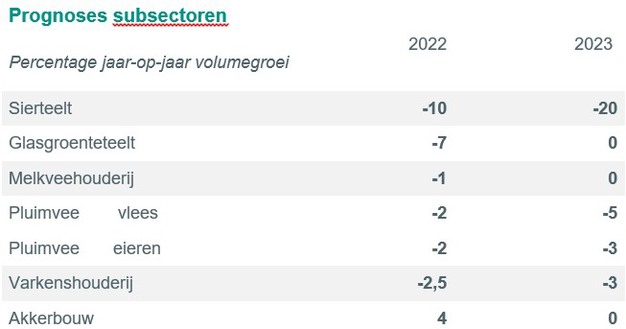Despite an exceptional year with huge cost increases for energy, feed, and fertilizer, many agricultural sectors are still holding their own this year. Indeed, in many cases, sales prices of agricultural products have risen enough to compensate for the higher costs. Across the agricultural sector as a whole, volumes are expected to fall by 2 percent this year, but differences between subsectors are high. In greenhouse horticulture, in particular, production has declined. In 2023, a slight drop in demand due to lower purchasing power could put pressure on margins, ABN AMRO concludes in its Agricultural Sector Forecast 2022-2023.

Subsector forecasts: ornamental plant cultivation, greenhouse vegetable cultivation, dairy farming, poultry farming (meat), poultry farming (eggs), pig farming, arable farming
A very sharp contraction (-20 percent) is also in prospect for ornamental plant cultivation in 2023
Ornamental plant cultivation and greenhouse horticulture, for instance, produce much less than in previous years. In ornamental plant cultivation, due to low purchasing power, volumes are likely to fall 10 percent this year and 20 percent in 2023. ABN AMRO stresses that the forecasts are surrounded by many uncertainties. In greenhouse horticulture (-7 percent), many companies have adjusted their cultivation strategy, bringing products to market later. There is then a shortage in winter, while there is a risk of surplus in summer. Costs also remain high for livestock farming in 2023; until now, many operators have been able to compensate with higher prices for products such as eggs and poultry meat. Prices for milk are even historically high. This was due to lower milk supply; production fell by 1 percent in the first half of 2022. In pig farming, high feed, energy, and labor costs put pressure on margins. This sector is struggling more than the other subsectors to maintain adequate returns. Arable farming (+4 percent) performed well, partly due to better-than-expected harvests and favorable prices; according to ABN AMRO, stable development of volumes is on the horizon for 2023.
2023 is an uncertain year due to declining purchasing power
Although performance varies by segment, the agricultural sector managed to hold up well this year. At the same time, costs remain high in 2023, and there will be more pressure on prices, which could make it a challenging year for many farmers. "Due to lower purchasing power, we see many businesses stumbling at the limit of what consumers are willing to pay. Lower demand from key supplier countries and from Dutch consumers could ultimately put pressure on prices throughout the food chain," says Nadia Menkveld, Sector Economist of Agricultural and Food at ABN AMRO. "Although cost increases seem to be past their peak, for many companies, the question is whether they can continue to pass on these costs. Food is, in principle, cyclically insensitive, but purchasing power is under pressure, and consumers will pay more attention to price and base their choice on this on the supermarket shelf. This affects the entire food chain and can put pressure on margins. In horticulture and greenhouse farming, it may be profitable to resell electricity to the grid instead of lighting crops in winter. In pig farming, we see companies that have invested in solar panels, heat exchangers, or other energy-efficient solutions benefiting. In arable farming too, more and more farmers are looking at investing in sustainable solutions, for example, to retain water and irrigate more efficiently."
For more information:
Nadia Menkveld, Sector Econoom Agrarisch en Food
ABN AMRO
Tel.: +31 (0) 6 13 54 51 47
Email: [email protected]
